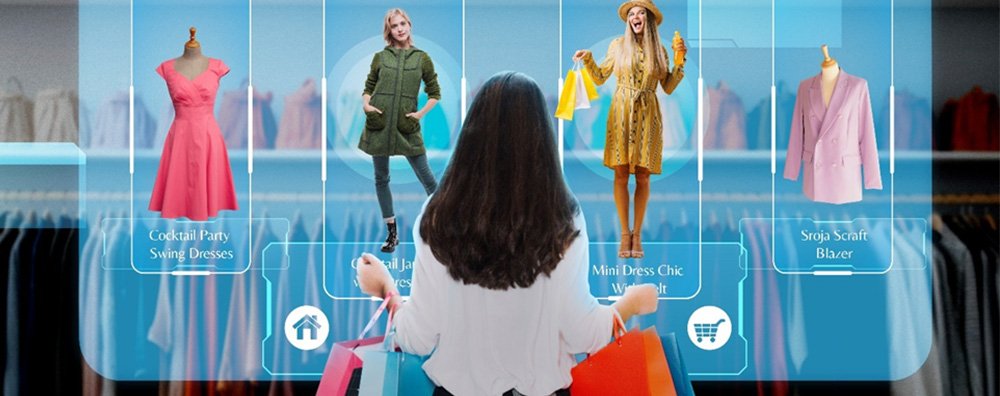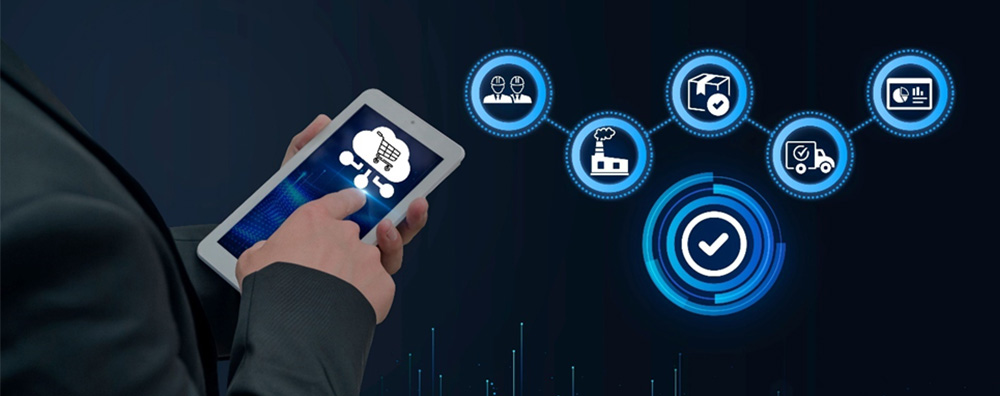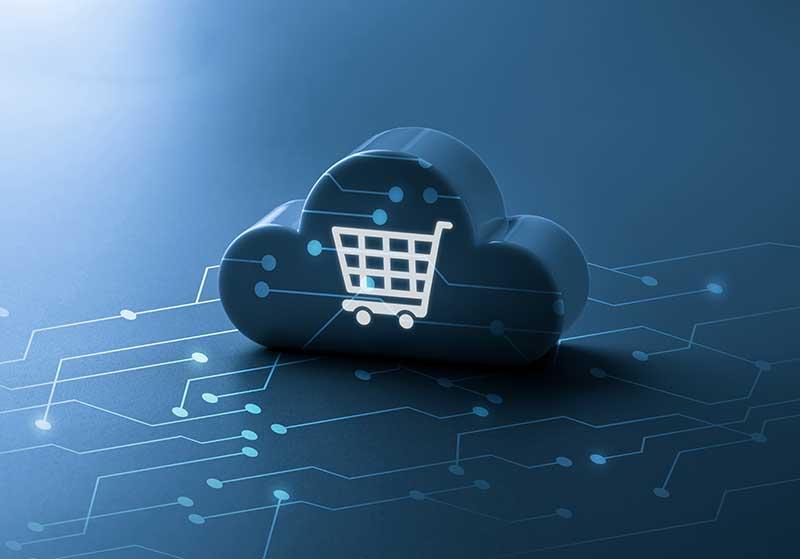In today's rapidly evolving retail landscape, embracing cloud retail solutions has become imperative. The surge in online retail and intensifying competition necessitates that retail businesses leverage cutting-edge technologies to stay ahead in the game. Among these technologies, cloud computing stands out as a game-changer – streamlining workflows, curbing IT expenses and enhancing the overall customer experience. By embracing cloud computing in retail, businesses can unlock a myriad of benefits that contribute to their success in the digital era.
Redefining retail operation with cloud computing
Cloud computing in retail refers to the use of cloud-based services and cutting-edge technologies to manage and securely store data, applications and infrastructure vital to retail operations. This transformative approach empowers retailers with the freedom to access their critical data and applications from any location, at any time, enabling them to streamline operations, boost efficiency and effectively curtail costs. Impressive statistics from a report by Globe News Wire reveal that the retail cloud market is expected to grow to $58.67 billion in 2027 at a CAGR of 16.7%. As the numbers ascend, it becomes evident that cloud computing in retail is set to redefine the landscape, revolutionizing how businesses operate and serve their customers.
Download the whitepaper: Red Teaming for Cybersecurity - Retail Industry Applications.
Gaining an edge with cloud computing in retail
Cloud computing empowers retailers with a competitive advantage over their e-commerce competitors by offering enhanced flexibility. In traditional systems used by offline retailers, they struggle to integrate with modern technologies and can be expensive to maintain. Cloud computing in retail, on the other hand, offers a streamlined and cost-effective alternative. By adopting cloud solutions, retailers can bid farewell to their legacy systems, freeing up resources to focus on growth and innovation. This newfound agility enables them to thrive in the digital market, gaining a distinct edge over their rivals.
The retail landscape is expanding far beyond the realms of traditional ERP, CRM and supply chain management (SCM). In the cut-throat competition of today, the importance of managed IT infrastructure has never been more acutely felt. It stands as the driving force capable of reshaping the age-old retail industry and helping them adapt to an ever-changing market. Even brick-and-mortar retailers can leverage a plethora of tools available to enhance communication among employees across various departments and locations. This effective collaboration paves the way for streamlined business management, reducing the chances of miscommunication and ensuring a brighter future for the retail sector.
Where does cloud computing in retail fit?

Retail is one of the top industry sectors with the highest cloud use, at 96.9%, with only 3.1% of retail businesses saying cloud technologies are not applicable to their business. And the reason for such high cloud adoption among retail is apparent – the e-commerce sites see high traffic during sales and the holiday season.
By leveraging cloud computing in retail analytics and social media, retailers can gain valuable insights into customer preferences and behaviors, enabling them to deliver personalized shopping experiences. The power of big data lies in its ability to process vast amounts of structured and unstructured data, which demands substantial computing power and storage. Cloud-based solutions step in to meet these requirements by offering on-demand storage and robust computational and analytical capabilities. This allows retailers to efficiently manage and harness the potential of big data, propelling them toward success in the dynamic retail landscape.
In this blog, we further delve into the 6 key advantages of cloud computing in retail to unlock a world of possibilities for your business.
Advantages of cloud computing in retail
Streamlined operations
Many traditional offline retailers find themselves operating in a disjointed manner, constrained by outdated legacy systems. This hinders their ability to efficiently integrate various business operations, from inventory management to shipping, development and point of sale (POS) activities. However, by embracing cloud computing, retailers can unlock the power to deliver seamless customer experiences tailored to consumer demands.
The impact of cloud computing on retail business means all departments and locations have real-time updates on the inventory, shipment and other aspects of the business at their disposal. Since POS systems are moving from cash and cards to smartphones and tablets, retailers can implement cloud technology for a smooth transaction process and better customer experience.
Customized shopping experience

Customers today have more options within their reach, and switching has never been easier. As little as two unsatisfactory experiences could prompt 86% of consumers to abandon a particular brand. However, utilizing cloud computing presents a remarkable opportunity to enhance customer loyalty like never seen before.
A pivotal question arises in the minds of retailers: can cloud computing effectively handle inventory and shipping? The answer is a resounding yes! Cloud computing brings a host of benefits, enabling stores to instantly access a customer's buying history and effortlessly track order statuses, regardless of when or where the purchase was made. This real-time access to comprehensive customer and order data empowers retailers to offer personalized recommendations, exclusive membership offers, coupon codes and other enticing promotions that foster customer loyalty. With cloud technology in place, retailers can even welcome customers with personalized messages or share enticing deals of the day as soon as they step into the store.
Cost-effective existence
The retail industry is one of the most rapidly evolving sectors. To cater to the fast-changing business demands, retailers need technology that must eliminate time spent on planning, procurement, budget approval for capital expenditure, development and other operational aspects. This is where cloud computing in retail comes in with a massive advantage over on-premises computing. A blog post from Google Cloud describes how Macy’s, an American retailer, leveraged cloud databases to enhance the customer experience and optimize the pricing services. By adopting cloud services, Macy's successfully streamlined its infrastructure, reducing complexity and maintenance and ultimately leading to significant cost savings. Walmart too used a multi-cloud strategy to optimize workload placement and was able to save millions in IT costs.
With cloud technology, retailers only pay for the resources they actually use. This brings considerable savings to their operational expenditure budget as they no longer need to worry about investing in hardware, software and connectivity. Additionally, the burden of system updates is shifted to the managed cloud services provider, relieving retailers of such responsibilities. This streamlined approach also reduces the need to hire dedicated IT personnel, further adding to the cost savings offered by cloud computing in the retail sector.
Scalability advantage
All retailers experience peaks and troughs in business. Most often, businesses depend on promotions, the time of the year, and even the weather. Hence, IT systems must be equipped to handle these ever-changing scenarios seamlessly. This is where the scalability advantage of cloud computing in retail becomes a game-changer. Target, an American retail corporation, uses cloud computing to power its website and mobile app, ensuring that it can handle high traffic volumes during peak shopping seasons.
With a cloud-based model, retailers can easily adjust the level of resources to match their actual usage, swiftly scaling up or down as needed, all in a cost-effective manner. Cloud computing in retail empowers businesses to seamlessly handle peak demand periods, ensuring that they can meet customer expectations without any hiccups. The cost flexibility of cloud solutions is bolstered by varied pricing options that depend on the increase or decrease of computing usage as per specific requirements. The scalability aspect of cloud computing opens up new avenues for retailers to grow and thrive in the dynamic marketplace.
Better supply chain visibility

SCM is one of the most critical business processes in the retail industry. A slip in any one of the processes can lead to irreparable damage. To fortify their SCM capabilities, retailers can turn to cloud-based models that offer seamless integration across every aspect of their business, providing enhanced supply chain visibility and robust enterprise application support. According to an Accenture study, executives on average attributed their cloud use to a 16% reduction in supply chain operating costs. 41% of all executives also said the desire to increase supply chain efficiency was a top-three reason for migrating their supply chains to the cloud.
Cloud computing retail can result in fewer stock-outs and optimized inventory levels and can also enable retailers to capture real-time location data on inventory and compare their stock with that of other locations. Using cloud computing, retailers can assess each individual element of the supply chain, from order status to product marketing. Cloud technology can automatically record relevant data that retailers can then use to make changes to their business processes.
Catalyst to create new products
Data analytics capabilities delivered by cloud computing in retail serve as a powerful tool for retailers to create innovative new products driven by customer feedback. Leveraging this technology, retailers can compile valuable information from various online sources, including competitor retailers and social media platforms, to gain insights into customer preferences and desires.
With all the relevant inputs, retailers get better equipped to judge what the current fashion trends are and which ones are set to become popular. By analyzing this information, retailers can make informed decisions about introducing new products in the market.
Read success story: Leading a Retail Major Through a Successful Quality Engineering Transformation
Conclusion
Cloud computing in retail has emerged as a game-changing technology in the industry, revolutionizing the way businesses operate and interact with customers. The six key advantages we explored collectively unlock a world of possibilities for retailers.
As the retail industry constantly evolves, predicting its exact trajectory in the coming years remains a challenge due to the ever-changing landscape of customer buying habits. However, amidst this uncertainty, one thing remains clear: cloud migration presents a robust solution that enables retailers to adapt swiftly to changing trends and consumer behavior. It empowers retailers to stay nimble and responsive, ensuring they can quickly align with emerging market demands. By harnessing the transformative power of cloud computing, retailers can confidently navigate the dynamic retail landscape and remain at the forefront of the industry, even with the risk of unpredictable changes.
Ready to unlock the full potential of cloud computing for your retail business? Contact us at digital@infovision.com today and let's take your operations to the next level!

